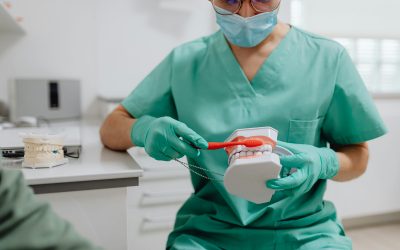Dental Nursing Resources and Advice
Giving impartial advice is at the heart of our mission. This page has a range of dental nursing resources and advice that will help you on your journey to becoming a NEBDN qualified Dental Nurse.
Read our latest blogs
NEBDN Level 3 Diploma in Dental Nursing (From July 2025)
Part 1: What’s New in the NEBDN Diploma – From July 2025 The NEBDN Level 3 Diploma in Dental Nursing is getting an important upgrade from 1 July 2025, bringing in modernisation, digital innovation, and tighter quality regulation. Whether you're a prospective student...
Your Career Journey Starts Here: A Guide for Aspiring Dental Nurses
If you're just beginning your journey as a trainee dental nurse, you're stepping into a rewarding and respected healthcare profession. But how do you move forward once you've secured your first placement—or even before? Who can help you grow, and where can you find...
How to Write a Standout CV as a Future Dental Nurse – Your First Step Towards a Career in Dentistry
If you’re starting your journey into dental nursing and applying for trainee roles, your CV is one of the most important tools you have to make a great first impression. Even without dental experience, a well-crafted CV can open doors—especially when supported by a...
What Dental Nursing all about?
The role of a dental nurse is to work alongside and assist dentists, therapists and hygienists in the care of patients.
In order to qualify as a dental nurse, you must pass the NEBDN National Diploma in Dental Nursing which takes 18–24 months.

What
What is Dental Nursing?
Read More
Dental nurses are essential members of the dental team. They work closely with dentists to provide patients with high-quality care. If you’re looking for a rewarding career in healthcare, dental nursing is a great option.

Why
Why become a dental nurse?
Read More
- Salary: a full-time qualified dental nurse at Frays Dental Centre (FDC) will start on approximately £27,000 (1); this compares to an average graduate salary of approximately £25,000 (2).
- Student debt: in England, universities can charge student tuition fees of up to £9,250 per annum (3). Assuming a 3-year degree course and factoring in maintenance, this can easily lead to student debts of £60,000 or higher (4). By studying with Frays Dental Education (FDE), dental nurses will earn while they learn, accumulating zero student debt.
- Flexibility: a dental nursing qualification is recognised nationally providing fantastic job mobility.
- Career progression: post-qualification, there are a number of different pathways available. Dental nurses who have studied with FDE have gone on to have careers in management, teaching, specialist nursing, or general dentistry.
Sources:
1 As of August 2023

How
How to qualify as a dental nurse?
Read More
- Pass the NEBDN National Diploma in Dental Nursing
- Apply for registration with the General Dental Council
National Diploma Explained
There are other ways to qualifying as a dental nurse, although here at FDE we only teach the NEBDN National Diploma.

What is the NEBDN National Diploma in Dental Nursing?
Read More
The NEBDN (National Examining Board for Dental Nurses) National Diploma is one of many pathways you can follow to become a dental nurse.
There are three sections which you must pass for the NEBDN National Diploma:
- A record of clinical procedures which shows that you know how to nurse (this is the Record of Experience ‘ROE’).
- A written examination consisting of multiple choice questions on the theory of nursing. Note; you cannot take the written examination until you’ve submitted your ROE to the NEBDN and passed this stage
- A practical examination (referred to as an OSCE) The OSCE cannot be taken until the written examination has been passed

Why just the NEBDN National Diploma pathway – is there no other way?
Read More
- There are other ways to becoming a dental nurse, although here at FDE we only teach the NEBDN National Diploma.
- There is plenty of information online – here are some other routes you could investigate:
- So, undertake plenty of research and do give us a call if you get stuck (although we can’t promise we’ll know too much about these other pathways!)

How to complete the NEBDN National Diploma?
Read More
- Find a course provider (you can attend online or in person) that can teach you the theory of dental nursing – this is in order to pass the multiple choice and practical exam part of the NEBDN National Diploma pathway.
- Find an employer who will take you on and train you in the practical parts of dental nursing. This is to pass the Record of Experience section of the NEBDN National Diploma pathway.
Finding The Ideal Course Provider
Many companies and some dental practices offer courses for the NEDBN National Diploma…but not all courses are created equal, so read this section before signing anything!

What to look for in a course provider?
Read More
In the Pdf document below, we’ve listed the most frequent questions asked by past and present students undertaking our courses.
You may not find all of these answered by your preferred provider, but at least you can ask questions forearmed with relevant information!

Why spend time finding the right course provider?
Read More
Because you need to:
- Reaffirm what works for you as an individual.
- Find a provider who is going to help you progress in the profession after qualification.
- Have all your questions answered in order to make a considered decision.

How to find the right course provider?
Read More
- Do your research! Use the questions in the Pdf document
- Speak to previous candidates.
Getting Practical Experience During Your Course
You cannot complete the NEBDN National Diploma without practical experience working in a dental practice and so will need to find an employer at some point.

Why is it important to find the right employer?
Read More
- This is a long-term relationship in which you can give yourself a headstart in your career by training in as many aspects of dentistry as possible

How to find the right employer.
Read More
- Do your research; use the questions in the Pdf document to help guide you
- Ask to speak to current employees and, if possible, previous trainees
- FDE’s NEBDN Foundation Course (AS THIS IS NOT AN NEBDN course)
Dental Nursing FAQs
As an accredited course provider for the NEBDN Diploma in Dental Nursing, we get asked a lot of questions and so have complied an list of FAQs.
Your Title Goes Here
Your content goes here. Edit or remove this text inline or in the module Content settings. You can also style every aspect of this content in the module Design settings and even apply custom CSS to this text in the module Advanced settings.
What are the entry requirements for the Dental Nursing Course and registration in the UK?
If you aim to register as a dental nurse and work in the UK, you must:
- Be at least 16 years old and legally allowed to work in the UK.
- Have GCSE English and Maths at Grade C or above, or equivalent qualifications (e.g., Functional Skills/Key Skills). Alternatively, you may take a literacy assessment.
- Everyone worldwide is welcome to explore and use the resources on the FDE website. In the near future, we will publish modules from the Diploma in Dental Nursing and Foundation Course, making them accessible globally.
We’re developing an online club/community, where members will have access to exclusive resources, articles on career development, insights into 21st-century dentistry, and tools to support their professional growth.
Am I too old to study dental nursing?
No! All ages are welcome to join the course and start their journey in dental nursing.
What funding options are available?
Funding options vary depending on the course provider. We provide flexible payment plans, enabling students to pay monthly and spread out costs.
Should I choose an in-person or online course?
This depends on your preferences and situation:
- In-person courses suit those who value face-to-face interaction and hands-on learning.
- Online courses offer flexibility, allowing you to study from anywhere at your own pace.
We’re currently developing an online course to make learning more accessible for everyone.
Can you help me find work placements?
Not at the moment, but we plan to develop a network of dental practices to assist students with placements in the future.
Is it easy to find employment after the course?
While we cannot guarantee employment, the demand for dental nurses is consistently high. Based on our experience, most qualified dental nurses find work easily.
I have a similar qualification from overseas. Is it transferable?
This depends on the General Dental Council (GDC) guidelines. Many overseas qualifications are transferable, but you should consult the GDC for specific advice about your qualifications.
Can I keep studying after the course?
Yes, and we highly encourage it! Further education can open up opportunities to specialize, grow your knowledge, and advance your career.
How do you support students during the courses and after?
We’re committed to providing students with the support they need to succeed, including:
- High-quality learning materials and expert tutor guidance.
- Mentoring services to assist with personal and career development.
- Access to an online club/community (currently in development) that will offer:
- Collaboration and networking opportunities with peers and professionals.
- Exclusive resources, such as career guides and modern dentistry insights.
- A space to stay connected and supported even after completing your course.
For more details, visit Frays Dental Education. You’re also welcome to arrange a complimentary advice session, either online or in person, to discuss your goals and get personalized guidance!
Free Downloads To Get You Started
Start your journey to becoming a qualified dental nurse by reading our PDF guides. Click on any of these resources to view and download.

Frays Dental Foundation Course
Students need to complete the Foundation Course before they can progress to the Diploma Course.

Frays Dental Diploma Course
Frays Dental Education is an accredited course provider for the NEBDN Diploma in Dental Nursing.

What to look for in a Training Provider
What follows is a guide rather than an exhaustive list of questions. You may not get everything from your Training Provider, so approach this list diplomatically and trust your instincts.

What to look for in a Training Employer
What follows is a guide rather than an exhaustive list of questions. You may not get everything from your Training Employer, so approach this list diplomatically and trust your instincts.



